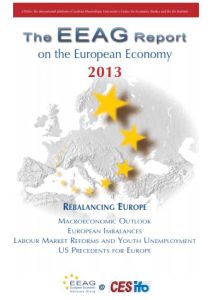
The EEAG Report on the European Economy 2013
Rebalancing Europe
Read or listen offline
Recommendation
For more than a decade, the European Economic Advisory Group’s economists have tracked the ups and downs of euro-zone economies. Their latest effort finds modest signs of hope and recovery, but identifies great differences between the northern and the southern single-currency members. In this report, the EEAG offers the distilled wisdom of six prominent economists who assess the European economy. They all agree that the very worst may be over for the crisis-hit euro zone, at least for now, but assert that only radical reform can significantly improve the competitiveness of Europe’s southern members. Though the threat is receding, the possibility remains that these nations could experience a massive deterioration that would deal a serious international economic blow. For those who seek details of the crisis across the diverse countries of Europe, charts, graphs and statistics lavishly illustrate this study. Its disadvantages are equally obvious: Letting six economists loose on a single piece of work invites a dose of committee-speak. Nonetheless, getAbstract welcomes the opportunity, through EEAG’s consistent reports –including this one – to consider economic trends over time.
Take-Aways
About the Authors
The authors, all professors, are: Giuseppe Bertola of École des hautes études commerciales, Nice; John Driffill, of the University of London; Harold James, of Princeton; Jan-Egbert Sturm, of ETH, Zurich; and Ákos Valentinyi, of Cardiff Business School. Hans-Werner Sinn, of the University of Munich, is president of the CESifo Group.



















Comment on this summary or Diskussion beginnen